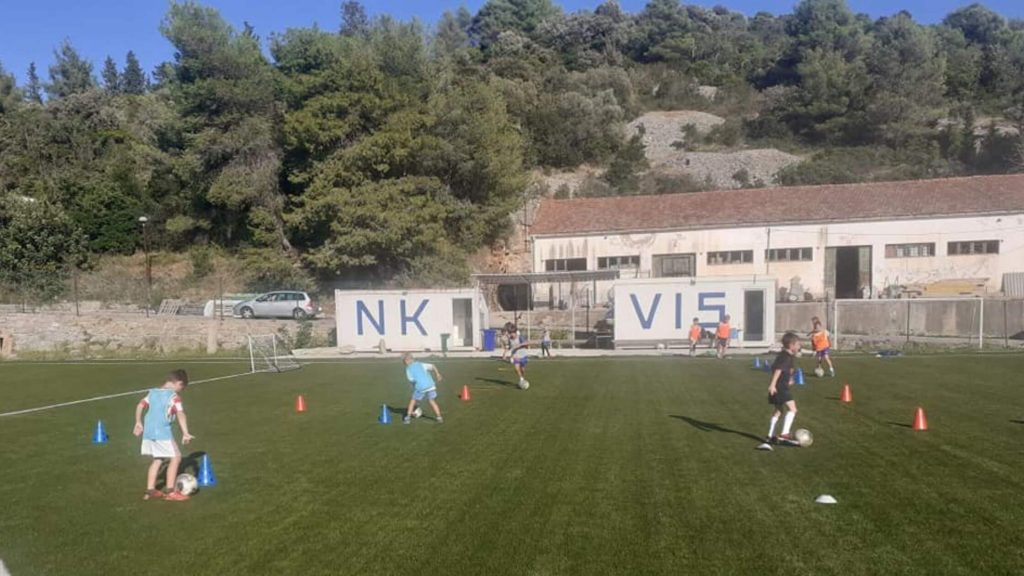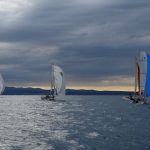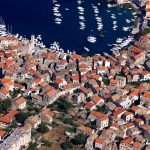Football is played around the world thanks to its simplicity – even in the most isolated places. Because Croatia is a small country, almost no one thinks of really isolated places, but if you sit on the ferry from Split to Vis, you’ll need to kill two hundred minutes of sailing to one of the most beautiful Adriatic islands. When Brač and Hvar are behind you, in the distance rises Vis, surrounded by sea-strewn cliffs, and right there on the high seas, there is a small club of the same name that has been resisting its geographical integrity for decades, writes Aldo Franičević for RTL.hr.
Football on the island has a long tradition, and NK Vis celebrated its first days back in 1935, but Vis had to replace the football with rifles due to World War II. At the end of the great war, NK Naprijed Vis was launched, which existed for three and a half decades. Interestingly, HNK Hajduk even played a friendly match against the Vis club.
Unfortunately, its isolation and lack of money left Vis without a football club in 1979, leaving only the summer indoor league on the island. Soon the island was left without a football field. In those years, it seemed like football had lost the battle with distance after decades, but in 2006 a miracle happened.
At the end of 2006, Marinko Ivanišević-Mane, with a handful of football enthusiasts, started a children’s football school on Vis and registered the Vis football club, thus renewing the continuity of the Vis football school after a 30-year hiatus. A few years later, Vis inhabitants first got a smaller football field, and in 2013, a large grass field was built with the help of the City.
The following year, they registered a senior team that competed in the 2nd County League for several seasons. Unfortunately, the senior team was short-lived, but the football school has survived and is stronger than ever under its young and ambitious leader Mario Potočnjak.
Potočnjak spoke about the success of the Vis football school but also revealed the many problems young footballers encounter living on the island.
“Before I came to the club, several coaches changed. In the beginning, there was enthusiasm, and then there was a senior team, but as time went on, interest and opportunities decreased as far as the senior team was concerned. They competed for a while, but they stopped before I came. After that, they played in the county league, but now they don’t play anymore. However, the football school is still alive, and I can say that it has grown nicely,” said Mario Potočnjak, a 28-year-old coach from Pag who has been leading the development of the sport on Vis for five years.
Although the senior team shut down some time ago, the football school is growing and thriving thanks to the efforts of coaches and the encouragement and support of the local community.
“This year, we have 70-80 students. Of course, that number varies, especially in the winter. We also work with preschoolers, which are children aged 5-6. We currently have four categories – 10-12 preschoolers, some boys, some girls, about 15 younger beginners made up of first graders, there are about twenty beginners and a group of younger pioneers competing this year in the 3rd County League, and there are just over 20 of them. These are mostly children from Vis and Komiža, with a few children from the surrounding areas. It should be said that these 80 boys and girls are quite a number considering the total number of children in the island’s primary schools,” says Potočnjak, adding that clubs on the islands face problems that they can hardly imagine on the mainland.
The biggest problem is the poor connection with the mainland and other islands, which is always a full-day trip, even when traveling to nearby Hvar or Brač.
“The worst thing is that when we play on land, we have to take the ferry at 5:30 in the morning from Vis, which means the kids have to wake up around 4 am. This is especially problematic in the winter, and it is in the winter that we cannot rely on a catamaran that should leave at 7 am from Vis because you never know what the weather will be like and whether it will run. The trip by ferry to Split lasts for over two hours, and the matches are played at 9 am. This is a big problem when it comes to performance on the pitch, but the worst thing is that it is very hard for children and takes a long time,” reveals the head of NK Vis.
“It’s still good when we play in Split because when we play in other places, it is even more problematic. For example, against clubs from Hvar, Brač. We are fighting a battle with the Federation and trying to explain to them that in this league of young pioneers, in which there are only seven clubs, we have the biggest problem when we go from island to island. Of the seven clubs, two are from Brač, Jelsa from Hvar, and we are from Vis. Those from the Federation think we are close to the islands, so it is easy. It is easier for us to go to Sinj or Imotski than from Vis to Brač and Hvar in winter,” says Potočnjak and immediately explains.
“When the weather is bad in winter, we would have to go from Vis to Split and then again an hour and a half back to Stari Grad on Hvar, arrange transportation to Jelsa and then repeat it all on the way back for an hour-long game. So when we have those games in the winter calendar, we somehow agree to move it to spring and then organize a speedboat or transport. In the end, it turns out ok, but it requires a lot of organization and money,” Potočnjak added and gave an example from the 14-hour visit to NK Postira Sardi on Brač.
“They couldn’t play that game on Saturday because other categories were playing for them then, and we decided not to forfeit and change it for a later date. So on Sunday, we leave Vis a little later, around 7:30. But the problem is with the return. The first boat to Vis that we can get is only at 7 pm. We were in Split by 3 pm, but we could only go home four hours later. We came to Vis around 9:30 pm. In other words, we spent about 15 hours going from Vis to Brač just to play an hour-long game, and the children go to school on Monday. That’s a huge amount of energy spent that way,” Potočnjak adds.
But as he says, giving up is not an option, and everyone is looking at how to make this positive. What saddens him is that his teams often fail to show their best performance when playing away, considering that they are exhausted even before they put on their jerseys and run on the pitch.
“I noticed a big difference in the quality of performance. We have a small base, and the difference is felt when you play against clubs from Split, but regardless of when they come to visit us, the game will be at 2 pm because they come by ferry from Split at 11 am. The visiting teams on Vis don’t have that problem. There is a big difference in the energy of our children when we play at home and away, so the result suffers a little, but in principle, the result is not primary,” Potočnjak said.
He is happy that the local community is actively involved in the club. Namely, a lot is being invested in sports and youth in the City of Vis, and even apartments for young families are being built, which suggests that the club could soon get more new players.
“NK Vis is almost exclusively financed by the City of Vis, and this is where we encounter small disagreements because many of the boys and girls in the club are from Komiža. Unlike the City of Vis, they have not had an understanding for years, and we have little help from them. This year, they helped organize transportation for children from Komiža, but now new problems have arisen. In addition, we have income from membership fees that amount to a symbolic one hundred kuna per month,” reveals Potočnjak and uses the opportunity to highlight the benefits the entire island has from the club.
“The club’s contribution to the community is great because, unfortunately, there is no other sports organization on the island in which children can join. There have been some attempts at basketball and the like, but it has not come to life. There is bowling and bocce in Komiža, but without belittling anyone and any sport, it cannot be compared to football. Practically, this is the only thing we have to offer children from systematic activities,” claims Potočnjak.
So, what ambitions do the club and the city have in the future?
“There’s no plan to re-establish the senior team at the moment. Some guys are more ambitious and would play, but it dies quickly, and the costs and fines are enormous. If the boys don’t get together or can’t go to the game, the Federation issues fines, and debts are still dragging on from when the senior team existed, so it is better to focus all energy and strength on youth,” concluded Mario Potočnjak.
He added that they are all focused on the 14th tournament for Vis City Day, which takes place on April 23 with several football teams.
To read more about sports in Croatia, follow TCN’s dedicated page.










